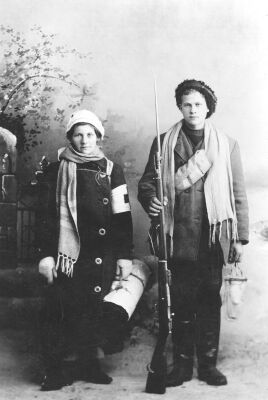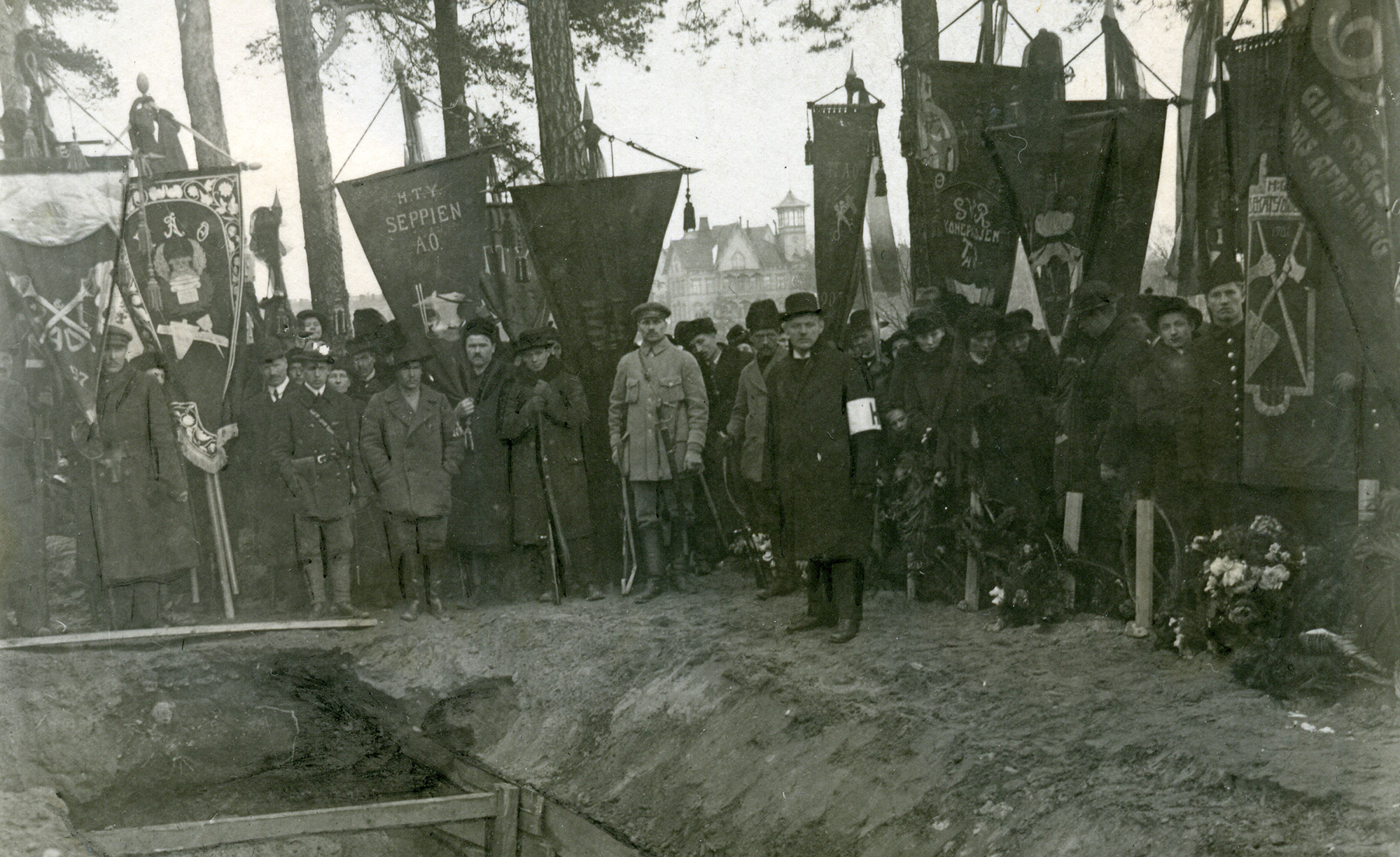|
Jussi Merinen
Juho Rikard Merinen (20 October 187320 April 1918) was a Finnish trade unionist, politician and member of the Parliament of Finland, the national legislature of Finland. A member of the Social Democratic Party, he represented Turku Province North between May 1907 and July 1908. He was executed by the White Guard during the Finnish Civil War. Early life Merinen was born on 20 October 1873 in Tyrvää. He was educated at folk school and Satakunta Agricultural Society's sculpture school. He worked as a carpenter and a farmhand in Tyrvää. Trade unionism, politics and death The Stormi Workers' Association (Stormin työväenyhdistystä) was founded in May 1906. Merinen, together with his brother August Merinen and Kalle Tyrvää from Laukula, were the key figures behind the association and Jussi was its first chairman. Merinen was a speaker at the first general crofters meeting (Ensimmäinen yleinen torpparikokous) organised by the Social Democratic Party in 1906. He was elected t ... [...More Info...] [...Related Items...] OR: [Wikipedia] [Google] [Baidu] |
Parliament Of Finland
The Parliament of Finland ( ; ) is the Unicameralism, unicameral and Parliamentary sovereignty, supreme legislature of Finland, founded on 9 May 1906. In accordance with the Constitution of Finland, sovereignty belongs to the people, and that power is vested in the Parliament. The Parliament consists of 200 members, 199 of whom are elected every four years from 13 multi-member districts electing 6 to 37 members using the proportional D'Hondt method. In addition, there is one member from Åland. Legislation may be initiated by either the Finnish Government, Government or one of the members of Parliament. The Parliament passes legislation, decides on the state budget, approves international treaties, and supervises the activities of the government. It may bring about the resignation of the Finnish Government, override presidential vetoes, and alter the constitution. To make changes to the constitution, amendments must be approved by two successive parliaments, with an election c ... [...More Info...] [...Related Items...] OR: [Wikipedia] [Google] [Baidu] |
1908 Finnish Parliamentary Election
Parliamentary elections were held in the Grand Duchy of Finland on 1 and 2 July 1908. Background The Russian Tsar Nicholas II dissolved the first modern and democratic Finnish Parliament after its Speaker, Pehr Evind Svinhufvud, refused, in the Tsar's opinion, to show enough respect for him when speaking at the parliamentary session's opening. In 1908, the Russian government restarted its Russification policy in Finland, limiting Finnish self-government. Campaign Most Finns, including most Finnish parliamentarians, opposed the Russification, but disagreed on the means to effectively oppose it. The Social Democratic Party's supporters hoped for positive results from their party's work in Parliament, such as the growing prosperity of workers and tenant farmers, but would be disappointed during the next several elections. The other parliamentary parties, with the partial exception of the Agrarians, considered the Social Democrats' demands, such as an eight-hour workday, too radic ... [...More Info...] [...Related Items...] OR: [Wikipedia] [Google] [Baidu] |
1918 Deaths
The ceasefire that effectively ended the World War I, First World War took place on the eleventh hour of the eleventh day of the eleventh month of this year. Also in this year, the Spanish flu pandemic killed 50–100 million people worldwide. In Russia, this year runs with only 352 days. As the result of Julian to Gregorian calendar switch, 13 days needed to be skipped. Wednesday, January 31 ''(Julian Calendar)'' was immediately followed by Thursday, February 14 ''(Gregorian Calendar)''. Events World War I will be abbreviated as "WWI" January * January – 1918 flu pandemic: The "Spanish flu" (influenza) is first observed in Haskell County, Kansas. * January 4 – The Finnish Declaration of Independence is recognized by Russian Soviet Federative Socialist Republic, Soviet Russia, Sweden, German Empire, Germany and France. * January 8 – American president Woodrow Wilson presents the Fourteen Points as a basis for peace negotiations to end the war. * January 9 ... [...More Info...] [...Related Items...] OR: [Wikipedia] [Google] [Baidu] |
1873 Births
Events January * January 1 ** Japan adopts the Gregorian calendar. ** The California Penal Code goes into effect. * January 17 – American Indian Wars: Modoc War: First Battle of the Stronghold – Modoc Indians defeat the United States Army. February * February 11 – The Spanish Cortes deposes King Amadeus I, and proclaims the First Spanish Republic. * February 12 ** Emilio Castelar, the former foreign minister, becomes prime minister of the new Spanish Republic. ** The Coinage Act of 1873 in the United States is signed into law by President Ulysses S. Grant. Coming into effect on April 1, it ends bimetallism in the U.S., and places the country on the gold standard. * February 20 ** The University of California opens its first medical school in San Francisco. ** British naval officer John Moresby discovers the site of Port Moresby in Papua New Guinea, and claims the land for Britain. March * March 3 – Censorship: The United States Congress e ... [...More Info...] [...Related Items...] OR: [Wikipedia] [Google] [Baidu] |
List Of MPs In Finland Imprisoned For Political Reasons
This is a list of Finnish Members of Parliament In modern politics and history, a parliament is a legislative body of government. Generally, a modern parliament has three functions: Representation (politics), representing the Election#Suffrage, electorate, making laws, and overseeing ... who were imprisoned for political reasons. Grand Duchy of Finland Imprisoned Civil War Executed Died in captivity Imprisoned Inter-war period Died in captivity Imprisoned Winter War and Continuation War Imprisoned Soviet Union Executed Died in captivity Imprisoned Other countries Imprisoned Notes References {{Reflist Imprisoned for political reasons Finland MPs ... [...More Info...] [...Related Items...] OR: [Wikipedia] [Google] [Baidu] |
War Memorial
A war memorial is a building, monument, statue, or other edifice to celebrate a war or victory, or (predominating in modern times) to commemorate those who died or were injured in a war. Symbolism Historical usage It has been suggested that the world's earliest known war memorial is the White Monument at Tell Banat, Aleppo Governorate, Syria, which dates from the 3rd millennium BC and appears to have involved the systematic burial of fighters from a state army. The Nizari Ismaili state, Nizari Ismailis of the Alamut period (the Assassins) had made a secret roll of honor in Alamut Castle containing the names of the assassins and their victims during Nizari–Seljuk conflicts, their uprising. The oldest war memorial in the United Kingdom is Oxford University's All Souls College, Oxford, All Souls College. It was founded in 1438 with the provision that its fellows should pray for those killed in the long wars with France. War memorials for the Franco-Prussi ... [...More Info...] [...Related Items...] OR: [Wikipedia] [Google] [Baidu] |
Tyrvään Sanomat
''Tyrvään Sanomat'' is a Finnish language newspaper published in Sastamala, Finland. It is the oldest local newspaper in the country. History and profile ''Tyrvään Sanomat'' was established by a primary school teacher in Tyrvää, Turku and Pori Province in 1894. The paper is based in Vammala, Sastamala and is distributed in the regions of Sastamala and Kiikoinen. The owner is the Alma Media Group which also owns many other newspapers, including ''Aamulehti'' and ''Iltalehti''. The publisher of ''Tyrvään Sanomat'' was Tyrvään Sanomat Oy until 16 April 2010 when Suomen Paikallissanomat Oy, a subsidiary of Alma Media Group, became its publisher. ''Tyrvään Sanomat'' became the first European newspaper which employed the VDT-based editorial system in 1974. As of 1998 the paper was published three times per week. Then its frequency became twice-weekly. Minna Ala-Heikkilä served as its editor-in-chief An editor-in-chief (EIC), also known as lead editor or chief editor, ... [...More Info...] [...Related Items...] OR: [Wikipedia] [Google] [Baidu] |
Civil Administration
Civil authority or civil government is the practical implementation of a state on behalf of its citizens, other than through military units (martial law), that enforces law and order and that is distinguished from religious authority (for example, canon law) and secular authority. The enforcement of law and order is typically the role of the police in modern states. History Among the first modern experiments in civil government took place in 1636 when Roger Williams, a Christian minister, founded the colony of Rhode Island and Providence Plantations. He sought to create a " wall of separation" between church and state to prevent corruption of the church and maintain civil order as expounded upon in his 1644 book, '' Bloudy Tenent of Persecution''.James Emanuel Ernst, Roger Williams, ''New England Firebrand'' (Macmillan Co., Rhode Island, 1932), pg. 24/ref> Types of authority Thus four forms of authority may be seen: *Civil authority * Military government, Military authority *Rel ... [...More Info...] [...Related Items...] OR: [Wikipedia] [Google] [Baidu] |
Red Guards (Finland)
The Red Guards (, ; ) were the paramilitary units of the labour movement in Finland during the early 1900s. The Red Guards formed the army of Red Finland and were one of the main belligerents of the Finnish Civil War in 1918. The Red Guards were first established during the 1905 general strike but disbanded a year later until they were re-established after the February Revolution in 1917. The combined strength of the Red Guard was about 30,000 at the beginning of the Civil War, peaking at between 90,000 and 120,000 during the course of the conflict, including more than 2,000 members of the Women's Guards. The Red Guards were defeated in Finland by the Whites in May 1918 and around 80,000 were captured as prisoners of war, where 12,000 to 14,000 of them died in the post-war prison camps due to disease, malnutrition, and execution. Most Red Guards were pardoned by the Government of Finland in late 1918. Approximately 10,000 to 13,000 Red Guards fled to Soviet Russia wher ... [...More Info...] [...Related Items...] OR: [Wikipedia] [Google] [Baidu] |
Finnish Socialist Workers' Republic
The Finnish Socialist Workers' Republic (FSWR), more commonly referred to as Red Finland, was a self-proclaimed socialist state in Finland during the Finnish Civil War from January to May 1918. The FSWR was established by the Finnish People's Delegation, a government formed by members of the Social Democratic Party to rival the existing Government of Finland, with support of the Red Guards. The FSWR controlled the capital Helsinki and most of southern Finland until March. Kullervo Manner served as its sole leader as Chairman of the Central Committee of the Finnish People's Delegation. The FSWR collapsed when the Red Guards were defeated by the White Finns and Germany, with Manner and most of the Finnish People's Delegation fleeing to Soviet Russia. The name "Finnish Socialist Workers' Republic" () appeared only in the Treaty between Finnish People's Delegation and Russian Council of People's Commissars, signed on 1 March 1918. The People's Delegation had earlier used th ... [...More Info...] [...Related Items...] OR: [Wikipedia] [Google] [Baidu] |
Turun Sanomat
is the leading regional newspaper of the region of Southwest Finland. It is published in the region's capital, Turku and the third most widely read morning newspaper in Finland after ''Helsingin Sanomat'' and ''Aamulehti''. History and profile ''Turun Sanomat'' was launched in 1905 as supporter of the liberal Young Finnish Party. The founder of the paper was Antti Mikkola, a politician and a journalist. It was subsequently owned and managed by Arvo Ketonen and, following his death in 1948, by his widow Irja Ketonen. ''Turun Sanomat'' was one of the conservative papers in the Cold War period. During this period it was one of the Finnish newspapers which were accused by the Soviet Union of being the instrument of US propaganda, and the Soviet Embassy in Helsinki frequently protested the editors of the paper. The paper has been officially politically independent and non-aligned since 1961. It is owned by TS Group. The paper is headquartered in Turku. It is published by TS-Yh ... [...More Info...] [...Related Items...] OR: [Wikipedia] [Google] [Baidu] |






